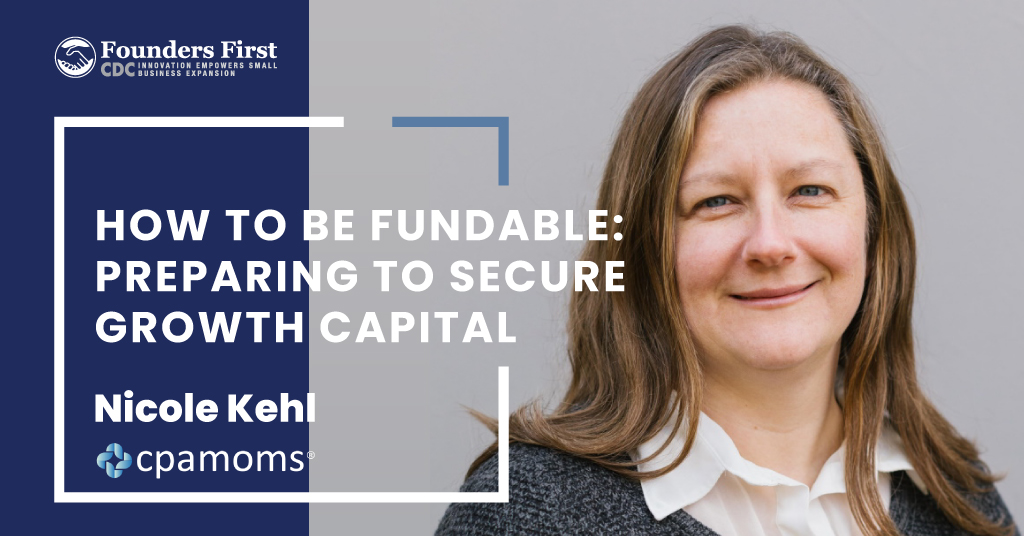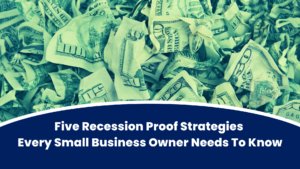Preparing your business to get funded isn’t easy, but an accountant offers best practices for getting ready.
Guest blogger Nicole Kehl, CPA is a franchise owner of CPA MOMS®. She is a CPA with over 12 years of accounting experience and covers how entrepreneurs can get ready for growth funding in this article.
I’ve had my own firm for over three years now. And since opening, I’ve put my focus on supporting real estate investors as they build generational wealth while also creating more time for the most important things in their life, like the people and activities that they enjoy most.
For real estate investors, funding is an important part of their business. I’ve helped many businesses get set up for funding. Most people are not prepared and it’s a scramble to get things in order. So the most important tip I can give you is to be prepared. I’d say from the very beginning of your business, check the box on the following items and you’ll experience less stress and be set up for success on the compliance and financial side.
Be compliant
First, be compliant. Taxes and registrations are required legally. There are fines, fees, penalties, and interest that can be assessed if you aren’t doing them and staying compliant, and funding sources will request these items. Now, legal documents are not necessarily required legally in the sense that you’ll get fines or penalties and interest if you don’t have them, but they should be put in place to protect you.
If you’re going into business with another person or entity, be sure to have an agreement outlining the terms of the relationship, how your profits and losses are allocated, and what happens if and when you decide to close out the business. These are all important, and funding sources will more than likely request these items as well.
Proper accounting
The next tip is proper accounting. Up to date and accurate records are very important. A lender will request prior year tax returns and year-to-date financial statements. The documents requested will differ depending on the time of the year it is, based on if your tax return has been filed. So, like right now it’s March, if you’re looking for funding, you may or may not have your 2021 tax return done, so they may ask for a 2020 tax return, 2021 financial statements, and then even potentially, year-to-date 2022 financial statements. Making sure that your business accounting is always up to date will ensure that you’ll be ready for whatever they request from you.
You also want to make sure that your financial statements are accurate in the sense that if someone with financial knowledge comes in, they can properly assess how much debt you can actually afford. You don’t want your statements set up to look really great and then potentially get a bigger loan than you can afford.
Partner with a financial expert
You need to find a financial expert that will partner with you to ensure that you always have up-to-date and accurate financial statements; someone who can organize and structure your financial statements to show the best picture of your business; someone who can give you tips on how to improve your financials in order to get the funding that you desire. This isn’t always an easy task. You can find a firm that outsources bookkeeping overseas, or someone that picked up bookkeeping by watching YouTube videos that will keep your books for as low as $15 an hour. Just keep in mind you get what you pay for. If you use someone that’s incompetent, you’ll end up paying 10 times more than you would if you found the right person from the start.
Also, you can find really great tax preparers. But what I’ve found is that generally, CPAs that focus primarily on tax preparation are keeping your books only to the point required to report taxes. So they may not be set up to necessarily provide you the information that you need to run the business or to help you get funding. You need to really find a professional that fully understands the tax and accounting side of it, and can then advise you from a holistic approach according to the goals you’re trying to achieve with your business.
Now, most lenders are going to want two to three years of financial history. Not two to three years of financial statements. So just to link this back to making sure you stay compliant, they’re going to want to see tax returns to know that you’re filing and paying those taxes and are up to date with the government. Because in case of insolvency, the government always gets paid first, and lenders know that.
Documentation you’ll need
Some lenders may ask for additional items to provide a very clear picture of your business. I suggest you provide as much good information as you can. This is not like an audit where you provide only what you’re asked for because you don’t want to provide something that may produce more questions. The more you provide, the better picture they’ll have of your business, and the more you can demonstrate how much research, time, and dedication you’ve put into the business. You’ll also demonstrate your experience and knowledge and effort to ensure success, which are all really great things to show a potential lender and can only help your chances of getting funding.
So, I’ll cover a few additional items that I suggest providing whether they’re requested, suggested, or not even mentioned at all. First is a business plan. If you aren’t sure what it is, Google it, you’ll find tons of information. But it’s basically a document that’s put together, outlining the business, your competition, your marketing plan, resource requirements, and financial projections.
Generally, people think of a business plan when you’re first starting out, which is a great time to have one, but you can have business plans later on in the life of the business as well, and really should have a clear picture of where you want the business to be moving towards. Your business plans may evolve as your business progresses. Instead of having just a general plan, you may have a separate marketing plan, a personnel plan, and a capital plan. But they require a lot of research and effort, which demonstrates how familiar you are with the industry and market that you’re trying to enter or are already in, and what obstacles may come up. They’ll allow you to think ahead on how to solve issues that you may run into before you encounter them and allow you to have a plan in place to avoid some of the common problems that businesses without the plan will have.
There are plenty of resources to help you put a business plan together, including your local Small Business Development Center (SBDC), and other experienced business owners if you’re in any groups like that. And then of course, professionals can help. Marketing professionals can help you on the marketing side. CPAs can help you with the financial projections. It’s just a really good document to have and provide your lender.
Other documents that will demonstrate how much time, energy, and effort that you’ve put into developing the business and the processes within it in a really efficient and effective manner are operating and accounting policies and procedures.
Tips for financial statements
Now, let’s circle back to specific tips on some financial statements. There are certain things that most lenders are looking for as they review your financials. Consistent or growing annual revenue is one of them. They’re also going to look for at least enough cash flow to cover the estimated loan payment for the loan amount you’re requesting, generally looking for a total monthly gross income to be at least one and a quarter to one and a half times your total monthly expenses. They’re also going to look to see if owners have invested equity in their own business. This shows, 1. that you’ve exhausted your own personal ability to fund the business, and 2. that you have a stake in the business, with the common adage that you aren’t going to pour your heart and soul into a business if you don’t have anything to lose from it failing. And as I previously mentioned, no one wants to compete with the government for money because they know they’ll lose, so no outstanding debt to the government.
Those are my top tips for how to make your company fundable. I hope they help. Remember, there’s no chance of getting funding if you don’t apply. So get your ducks in a row and then go for it!
CPA MOMS® is a 100% virtual national accounting and tax franchise that provides “mompreneurs” with the opportunity to build a firm while having a family. CPA MOMS® Franchisees are highly skilled and experienced professional CPAs who provide high quality bookkeeping, accounting, and tax services to small business owners nationwide. Learn more at www.CPAMOMS.com.




